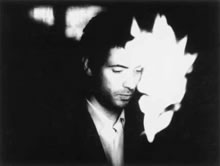| How do you come to deal with the present in black-and-white and the past in colour?
I didn't want to treat it chronologically. In view of my age, I was leaning more toward a narrative film, one that happens through Eglantine and others. I had to give this feeling. So I thought it would be more appropriate to work against the generally accepted idea of showing the present in colour and the past in black-and-white, as in newsreels. On the contrary, I wanted to find a way of intensifying the past.
Is that what gives the impression that the past sheds light on the present?
No, I think that colour is closer to us because it's the present tense of film projection, emotionally speaking. I've always loved Proust's novel. When he speaks of Albertine in the imperfect tense, the reader experiences it in the present. Especially as an adolescent. Eloge de l'amour is very structured, more than usual.
That's because it took a lot of time. It's strange, but there's always been a blank in my films, about an hour into the screening. I find that lots of films slump around this point and since the script is a life buoy, the director pulls out of it by filming the script, but in the process he loses the cinema. Here, there was a blank an hour in. The first part ends at exactly an hour into the film, the blank is there, but this time it's accepted as such and what goes with it is accepted as such, too. That's because of age, and time, too, the time you've spent making the film. The problem was that it was a long, disjointed shoot, in several sections, and the mixing was difficult. It was something of a strain. 
Why did the film take so long?
Because I was a bit lost, but I kept trying to do it anyway. In fact, you have to just do it and then you have to cut later. It's harder in film because it's a very social world, with problems of time, money, people and psychology.
So it's much more difficult than, say, with a painter or a novelist, to go: "We'll shoot this, but we know we're shooting to move on to something else; still, you have to go through this, it's practice. You shoot to practice, not to come up with a good shot. You practice because the game is coming up in two weeks." It's hard to do that, besides you're not aware of it, but later, during editing, you suddenly say: "All this goes and this is all that's left in the end." And this time I said: "It's a miracle!" So the film was shot in several sections. In February, then in September. Then in Brittany. At that point, I didn't know what I wanted to do. It was a bit frantic. I didn't really know, but I must have heard something. My vacation in Brittany was with family. There were too many personal things. I couldn't tell the difference between what was personal and what was the film. I remember that JLG on JLG was a film I shot very quickly because one day I read in the contract: "Delivery in a month." But the film was about me, it answered to me. Whereas with Eloge de l'amour I had to answer to the film, but I realised that I was asking the film to answer to me, and that wasn't clear. So Brittany wasn't easy to get in the can, as they say. Then I acted in Anne-Marie Miéville's film, which did me a lot of good, but we had to put everything off for four months, so the production turned out disjointed. |